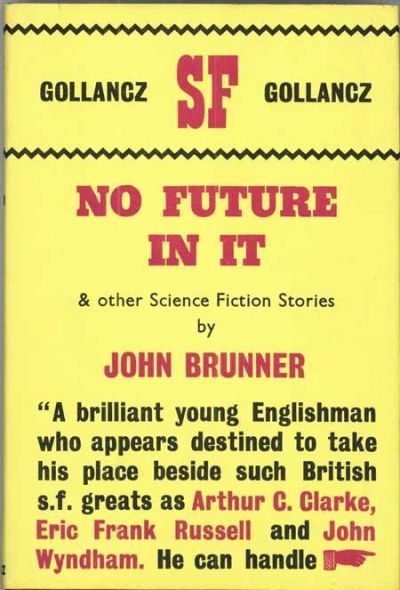We All Shine On
No Future In It and Other Stories
By John Brunner

28 Mar, 2023
John Brunner’s 1962 No Future in It and Other Stories is a short story collection. As far as I can tell, it was John Brunner’s first short story collection.
How can it be the last Tuesday in March already?
I selected the cover I did because of the teaser. If anyone knows that the back cover said, please tell me in comments. The copy I found has a less eye-catching and uncredited cover. On the plus side, my paperback includes a snippet of what seems to have been a favorable review from Marghanita Laski1.

Interestingly, at least to me, while this collection did merit a Science Fiction Book Club edition—the mark of quality science fiction!—it was an SFBC UK edition. The US SFBC does not appear to have picked it up.
Although very short by modern standards2, No Future in It is not without its stories of interest. The title story, for example, is a competently executed comedic tale of a would-be alchemist interpreting facts through a narrow cognitive lens. Unsurprisingly, it, along with “Fair,” is one of two stories in the collection selected for The Best of John Brunner. On a more negative note, 1956’s “The Windows of Heaven” is extremely reminiscent of Alfred Bester’s 1941 “Adam and No Eve.”
At this point in his career, Brunner was focused more on rate of output rather than more ambitious goals. The majority of the stories are competent but not memorable; good enough to earn a sale, even a reprint or two, but unlikely to be remembered sixty years later.
No Future in It is out of print.
Now for a deeper trawl.
“No Future in It” • (1955) • short story
An unwilling Renaissance alchemist doesn’t have to disappoint his patron thanks to the intervention of a being whose nature the alchemist completely misunderstands.
Puzzle for Spacemen • (1955) • novelette
The dead astronaut presents a puzzle to authorities. All solutions to this puzzle seem to end in profoundly negative consequences.
This is a murder mystery. It’s also about workplace stress and how to manage it.
“Fair” • (1956) • short story
What secret purpose drives the popular fairs? A covert attempt to better humanity, which is a theme to which Brunner would revisit in this collection.
“The Windows of Heaven” • (1956) • short story
The first lunar explorer survives the sun’s mini-nova thanks to his spacecraft. The Earth is not so lucky. The astronaut is the last remaining terrestrial life-form. How can one Adam replenish the Earth with no Eve?
Aside from the great calamity being a natural event and not the astronaut’s own fault, the plot and eventual resolution of this story are remarkably close to Alfred Bester’s earlier “Adam And No Eve.” Close enough that I don’t see how this saw print.
“Out of Order” • (1957) • short story
An apparent flaw in the global supply chain system has alarming implications. The cause may be even more alarming.
This is a joke of the form “computers are literal” and “be careful what you wish for.”
Elected Silence • (1962) • novelette
Rescued from aliens after decades of imprisonment, a former prisoner struggles to adapt to civilian life.
Alas, the ending of this was a bit telegraphed.
“Badman” • (1960) • short story
What secret purpose does the Boogie Man serve?
The same one the Fair did. Not only does Brunner seem to have liked this theme, so did editor John Carnell of New Worlds, who purchased both stories.
“Report on the Nature of the Lunar Surface” • (1960) • short story
Unanticipated properties of the lunar surface facilitate a cheesy joke.
“The Iron Jackass” • (1962) • short story
Management struggles to convince miners on an alien world to accept robots of the very sort that left so many unemployed on Earth.
Automation-driven mass unemployment used to be a common theme way back when. Blame Norbert Weiner’s convincing commentary on the subject. Given the rise of AI-art and writing, SF authors might want to revisit the idea … before they’re put out of work by machines.
“Protect Me from My Friends” • short story
Telepathy is not fun.
Stimulus • (1962) • novelette
How could a talented ecologist like Achmed Khan commit such an epic blunder? Perhaps this makes sense if the blunder was no blunder at all.
This is notable because this colonial system includes institutions to monitor colonist interactions with local ecologies, organizations with the legal authority to evacuate worlds if they think it is warranted. The colonists’ perception of how frequently worlds are closed to settlement is highly exaggerated.
1: Marghanita Laski wrote a nuclear war play, The Offshore Island, which seems to be out of print. However, I see my favourite academic library has a copy. Hmmm.
2: Reading this collection did remind me how much fun it can be to have a complete book that can be read in a couple of hours.
